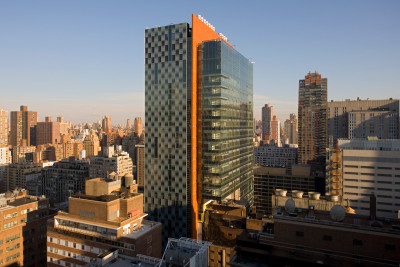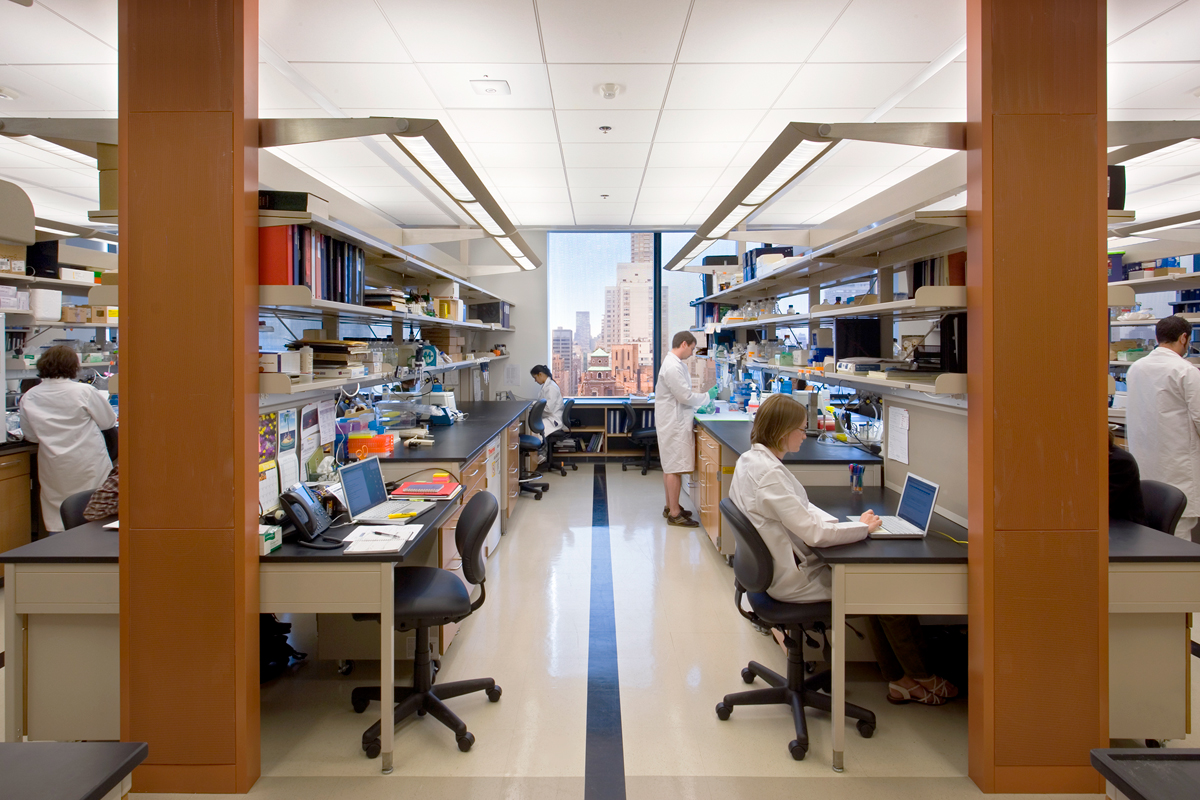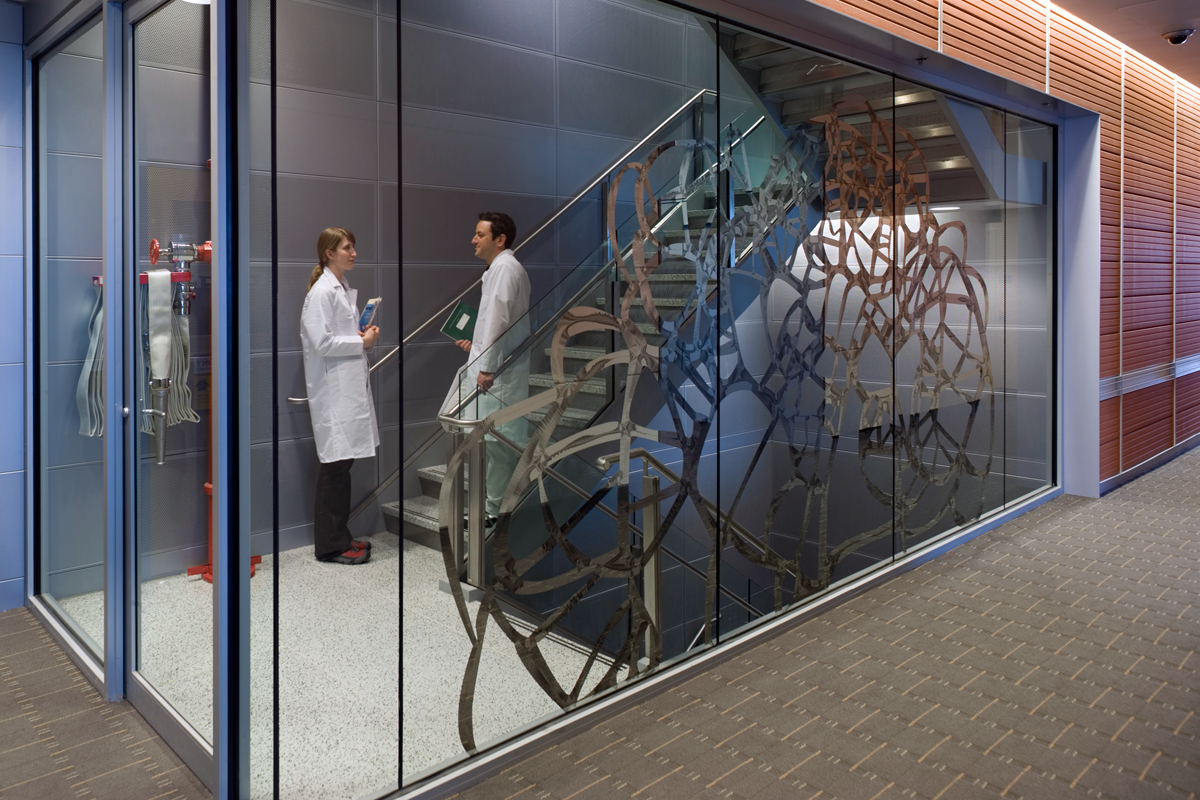
The Mortimer B. Zuckerman Research Center
Memorial Sloan Kettering Cancer Center (MSKCC) is now poised to take greater advantage of a new era in cancer research and education with the opening of a state-of-the-art research center, the establishment of a new graduate school, and the founding of a novel research program in human oncology.
These major developments in the pursuit of innovative cancer research and education will be celebrated with a trilogy of events from September 19 - 21, 2006 at MSKCC.
“Achieving the medical promise of cancer research requires a deeper understanding of the biology of cancer and imaginative application of new knowledge in the clinic,” said MSKCC President Harold Varmus. “The expansion of our research and educational programs to better understand the genetic and biochemical mechanisms by which cancers arise and behave will lead to improvements in detecting, classifying, monitoring, and treating cancer.”
Memorial Sloan Kettering has nearly doubled the size of its research enterprise with the official opening of a new research complex, named in recognition of a $100 million gift from Memorial Sloan Kettering Boards member Mortimer B. Zuckerman - the single largest commitment by an individual in the Center’s history.
The first new research facility for MSKCC since 1989, The Mortimer B. Zuckerman Research Center’s 23-story building is uniquely designed to provide basic scientists and clinical investigators with an inspiring, interactive, and efficient environment in which they can work together. A second phase of construction is now underway to build a connecting seven-story structure. One of the tallest laboratory buildings in the world, the 693,000 total-square-foot research complex will cost an estimated $503 million.
A three-day celebration of public lectures beginning on September 19 and ending with an open house at the Zuckerman Research Center on September 21 not only recognizes the official opening of the new research facility, but also celebrates the inaugural class of the Louis V. Gerstner, Jr. Sloan Kettering Graduate School of Biomedical Sciences, and acknowledges the establishment a novel research program in human oncology, the Human Oncology and Pathogenesis Program (HOPP).
The new graduate school offers a novel doctoral program that trains basic laboratory scientists to work in research areas directly applicable to human disease and, in particular, cancer. HOPP is a major hospital-based initiative in which scientists and physicians aim to translate laboratory findings into novel approaches to cancer detection, diagnosis, treatment, and prevention.
Both of these programs are housed in The Mortimer B. Zuckerman Research Center, located across the street from Memorial Hospital. The proximity encourages interdisciplinary efforts as scientists and physicians work in concert to achieve a better understanding of cancer and develop new, more effective ways of controlling the disease.

A Laboratory in the Zuckerman Research Center
The 23-story portion of the facility includes 16 floors of state-of-the-art laboratories that are configured to foster interactions important to productive collaborations among basic scientists and clinical investigators from different disciplines. These floors incorporate an open, “modular” laboratory design that provides the ability to customize and reconfigure each area based on the evolving needs of the investigators. Generous nine-and-a-half-foot-high ceilings on each laboratory floor also allow for flexibility in equipping those areas.
These laboratories will accommodate the Center’s programs in immunology, molecular pharmacology and chemistry, and cancer biology and genetics. The facility will also include shared core laboratory facilities such as high-throughput drug screening to identify small-molecule drug candidates and nuclear magnetic resonance that will provide crucial equipment and technical support for work conducted by multiple programs. The connecting seven-story structure will add a conference center with a 350-seat auditorium and a number of “dry” laboratories, including space for computational biology.
The research facility features a strong emphasis on energy-efficiency and environmental sustainability and it is expected to be among the first research buildings in New York State to receive certification from the Leadership in Energy and Environmental Design (LEED®) Green Building Rating System™, a benchmarking standard developed by the U.S. Green Building Council that evaluates the environmental performance of buildings. LEED® certification recognizes a construction approach that optimizes environmental and economic factors such as water savings, energy efficiency, materials selection, and indoor environmental quality.
Designed by Skidmore, Owings & Merrill LLP in collaboration with the Zimmer Gunsul Frasca Partnership, the facility was built by Turner Construction Company under the direction of Memorial Sloan Kettering’s Facilities Management. Construction began with the groundbreaking in the spring of 2002 and the first occupants moved into the building in May 2006.

Interaction Staircase
Original, permanent art installations are also a unique feature of the design of the facility. They include imagery in the glass of the “interaction staircase” (centrally located and designed to encourage exchanges and chance encounters among researchers throughout the 23-story building) featuring mirrored surfaces and silk-screened glass; a distinctive “sculptural ceiling” in the Cyber Lounge (a central gathering place for researchers and students); and other commissioned artwork for the connecting seven-story structure in what will become the permanent lobby of the research center.
MSKCC is the world’s oldest and largest institution devoted to prevention, patient care, research, and education in cancer. Its scientists and clinicians generate innovative approaches to better understand, diagnose, and treat cancer. MSKCC’s specialists are leaders in biomedical research and in translating the latest research to advance the standard of cancer care worldwide.